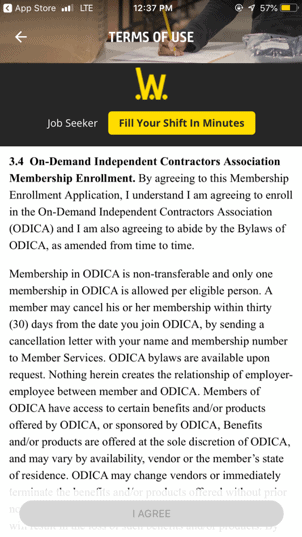
Veena Dubal is a professor of law at the University of California, Hastings.
With the so-called “uberization” of work, any number of gig companies may be deserving of “the most scandalous” award. Perhaps the dubious honor should go to Uber itself which has sparked the imagination of venture capitalists and entrepreneurs the world over, inspiring them to use the guise of technology to transform traditional low-wage labor into even more low-paid, on-demand, unprotected, and unpredictable work. Maybe it should go to DoorDash which unabashedly uses the tips of customers to pay its workers. Or is Amazon Mechanical Turk the truly deserving entity? After all, as a “new kind of poorly paid hell,” mind-numbing Turk work sometimes pays only pennies per job.
As a scholar who closely watches and studies the proliferation of gig work, I might also consider nominating Wonolo—the rapidly-growing gig company you have never heard of. Wonolo, short for “Work Now Locally,” is essentially a next-generation, blue-collar temp staffing agency that specializes in warehouse work (but also advertises to companies seeking temporary labor for delivery work, event staffing, janitorial services; etc.). It was “incubated” by Coca-Cola, whose retail outlets often needed spot labor to set up displays in supermarkets and convenience stores. Most staffing agencies in the US employ workers who they contract out to third parties on a temporary basis. While hardly ideal, this means that historically, temp workers have been employees of the staffing agencies and thus get some basic protections, including the minimum wage and workers’ compensation. (For a fascinating, history of staffing agencies, their post-War origins, and gender politics, read Erin Hatton’s excellent book The Temp Economy.)
The company has been touted in the media as giving workers a “choice” between employee and independent contractor status. This so-called choice, however, is misleading (at best). When I signed up to become a “Wonoloer,” I found that the (long) contract (which includes both mandatory arbitration and class waiver clauses) states that Wonoloers are “never employees of Wonolo.” Rather, some companies that hire through Wonolo are “Payroll Companies” who may choose to employ a Wonoloer. The choice of worker status, then, is not with the worker but with the third-party corporation. This is, in some ways, a pushback against the responsibility that staffing agencies have traditionally taken on behalf of the companies who contract with them.
Wonoloers are thus treated like independent contractors. These day-laboring warehouse gig workers—regarded as small business owners—are not guaranteed a minimum wage, overtime protections, workers’ compensation or unemployment insurance. But, because of the intense occupational hazards of warehouse work, Wonolo requires them to maintain and pay for their own safety insurance. If workers do not provide proof of this (and I saw no opportunity to do so during the hiring process), Wonolo takes a chunk out of their paycheck and automatically enrolls them. The Wonoloer gets very little to no information on what this private occupational insurance might cover and cost (or even why she might need it), but the amount disappears from her paycheck.
Upon closer examination, Wonolo, like many other gig companies—appears to be misclassifying its workers. Workers are controlled not only by Wonolo, but also by the third-party contracting companies. When I attempted to become a Wonoloer myself, I did an electronic job-training on my mobile phone. This training—ingeniously cloaked in the form of a quiz—taught me that I did not have as much flexibility and independence as I might think. Rather, I could get kicked off the app if I withdrew from 3 jobs within 30 days (which I might have to do if my child gets sick, or if my just-in-time retail employer calls me in for work during a conflicting time). I could also be fired if I received a 1, 2, or 3-star rating from a contracting company or if I withdrew from my job within less than 12-hours before starting time. If I don’t show up, I get suspended. My behavior is also dictated as I am condescendingly reminded to “be respectful” and to “bring [my] best professional attitude every time.” After being “onboarded” (that’s the gig economy’s euphemism for hired), without meeting anyone or doing any work, I felt an awful lot like a Wonolo employee.
Insidiously, Wonolo’s business model has the potential to impact work beyond the immediate reach of the company itself. When workers sign up, they are automatically enrolled as members in the “On-Demand Independent Contractors Association.” As default members, they have to abide by the ODICA bylaws (“available upon request”) and to pay a non-transferable fee. The “benefit” to the Wonoloers is an App Exchange; they get “a resource page for application and tools that might be meaningful to…independent contractor members” (like Genius-Scan…an app that acts as a scanner in your pocket). In order to “opt-out” of this membership, Wonoloers must send a cancellation letter to membership services within thirty days of signing up.

Why is automatic enrollment in ODICA significant? The “automatic membership” gives Wonoloers no voting rights but allows the ODICA to speak on behalf of their members. In this political moment of heightened lobbying and rule-making around gig economy issues, the ODICA may tell law-makers that they represent the interests of tens-of-thousands of independent contractor workers—without ever having to consult with those workers or represent their interests. If ODICA uses the automatic fee for political spending (on their webpage, they claim to do advocacy), such an arrangement would certainly go beyond what unions are permitted to do under Beck and, if there were state action, would also raise compelled speech questions.
Troublingly, the people most likely impacted by this unprotected, precarious physical labor (that can be secured without an in-person interview) are those on the margins of the workforce: men and women of color who are disproportionately targeted by the criminal justice system; probationers, parolees, and others who may have work orders and are thus forced to work against the threat of incarceration; and immigrants without documented status. This reality makes digitalized day labor that much more exploitative and in need of close regulation. But with mandatory arbitration clauses, class action waivers and membership in an association that likely does not represent their interests, workers have very little means to resist or push back against abusive practices.






Daily News & Commentary
Start your day with our roundup of the latest labor developments. See all
February 19
Union membership increases slightly; Washington farmworker bill fails to make it out of committee; and unions in Argentina are on strike protesting President Milei’s labor reform bill.
February 18
A ruling against forced labor in CO prisons; business coalition lacks standing to challenge captive audience ban; labor unions to participate in rent strike in MN
February 17
San Francisco teachers’ strike ends; EEOC releases new guidance on telework; NFL must litigate discrimination and retaliation claims.
February 16
BLS releases jobs data; ILO hosts conference on child labor.
February 15
The Office of Personnel Management directs federal agencies to terminate their collective bargaining agreements, and Indian farmworkers engage in a one-day strike to protest a trade deal with the United States.
February 13
Sex workers in Nevada fight to become the nation’s first to unionize; industry groups push NLRB to establish a more business-friendly test for independent contractor status; and UFCW launches an anti-AI price setting in grocery store campaign.